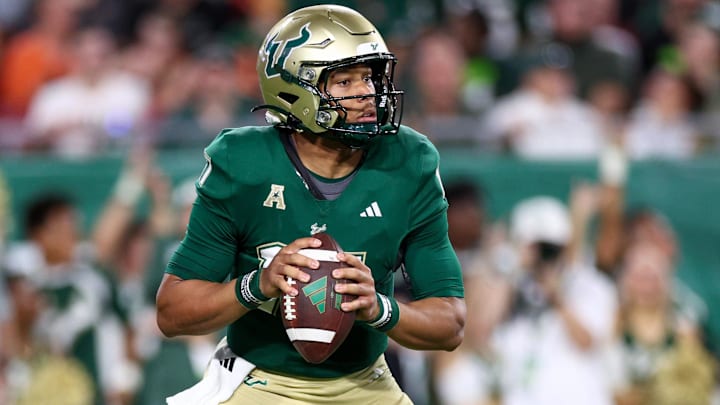If you want to be a running back for the USF football team, you need to get one thing straight.
You'd better know how to block and protect the quarterback.
“We wouldn't recruit a running back if we didn't feel like he was going to have the mindset, the ability to protect,” offensive coordinator Joel Gordon said.
“We're going to throw the rock. We're going to throw down the field a bunch. So those guys know it.”
Veteran USF running backs Cartevious Norton and Sam Franklin have been around college football long enough to understand the deal. The last thing a back wants is the blame for missing a block that gets the quarterback injured.
New guys fresh out of high school might take a little longer.
“You're going to be blocking linebackers, safeties. These guys, a lot of times, are going to be running full speed right at your face,” Gordon said. “So the physical technique, not just the technique of the mindset that I'm gonna go throw my face in here and protect, okay, that's a different that's a different way of living for a lot of running backs.
“You can block a high school linebacker. A lot of high school linebackers are a buck 80. Man, there's going to be some 220-pound linebackers (in college) trying to run through your face out there.”
Norton was asked if pass blocking for a running back is akin to a five-second street fight.
“That's pretty much it. You go in there, you thud up, and then hold them up for probably about three or four seconds,” he said.
“The quarterback should have the ball out of his hand by then, or probably scrambling or something.”
That’s the physical part of it, of course. But seeing the big picture is just as important. A huge of that scene is understanding what it takes to stay on the field.
“Every coach that recruits you knows you can run the ball. I just say (not protecting well) would take them off the field on important downs, like a third down,” Norton said. “Everybody wants to be in, get the first down, but also, you gotta block. If you can't really block, you can't be in on third down, with coaches sending blitzes depending on the situation.”
Head coach Alex Golesh left no doubt about that. At the go-go-go pace USF likes to play, backs have to think and react quickly to make the offense work. A lot of times, that means making sure the quarterback can get the ball where it needs to go.
No running back starts in high school thinking, man, I sure want to be the best blocking back in the conference. But here, where the stakes are higher, it’s part of the package.
“More than even just the ability to run the football for us, it's the ability to catch it out of the backfield. It's the ability to protect the quarterback. Maybe anything above, just as important as running the football, you've got to be able to protect the quarterback,” head coach Alex Golesh said.
“And the hardest part for young guys in this system is to learn is that if you ain't out at 100 percent, you're not gonna play.”
